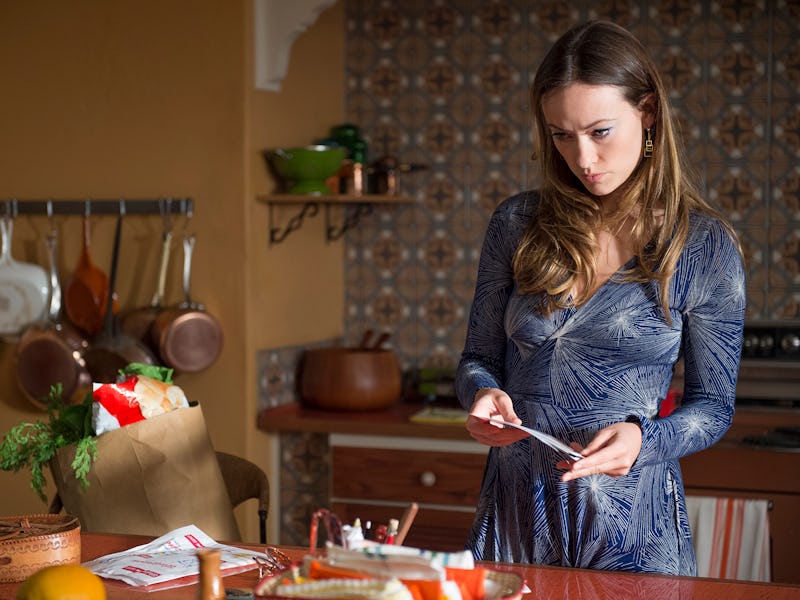'Vinyl' Episode 4 Gives Olivia Wilde the 'Mad Men' Treatment
We're expected to care about a Betty Draper-like stereotype. What would Alison Bechdel say?

January Jones has been much-disparaged as an actress, yet, at the beginning of that popular 1960s period piece of a show she co-starred in — Mad something? — one remembers yearning for more of her character as the show progressed. Betty had the potential for a fascinating arc — to become as big of a character as Don. Jones’s slightly wooden aspect fit with the suffocating domestic atmosphere. The images of repressed thoughts and desires were compelling, an apt complement to Don’s own: In the first two seasons, Matt Weiner laid out depth charges, hinting at a more expansive Betty psychology through pregnant stares, moments of late-night reflection, and some of the show’s only convincing dream segments. Also, she’d get out to events and on trips, and interact with other characters — at least, for a while. We would see Betty, dissatisfied, out in the world.
Then, after Don left the Tarrytown nest and the rest of the show gained more mass — new characters, company names, affairs, hairdos, offices — Betty’s drama became something Weiner just checked in on. For a season, Betty’s private struggle was with leftovers and Hostess products; toward the end, we were forced to give a shit about her relationship with Glen again. Her new husband, Henry, had moments of sharp characterization, and like a flash in the pan, their relationship would seem interesting for a moment. Then he would be pulled away before we could really see him for being anything other than exactly what he appeared to be: boring, traditionally-minded, emotionally withdrawn, and nothing too exceptional or secretly sordid.
Betty’s struggle, for the better part of Mad Men, was an element we were expected, also implicitly, to care about. But smoking dead-eyed at the kitchen table, either being snarky or sobbing — somehow nothing ever really felt earned. It seemed like a squandered opportunity. Four episodes into HBO’s Vinyl, Olivia Wilde’s Devon has already become a Betty equivalent. She’s already at the height of her conflicted, highly charged cold war with her self-absorbed and self-destructive husband, Richie, and she’s already marginalized in the show’s scripts. Her battles, like Betty, are often waged staring tearfully into the darkness from bed, or gazing into the drain of the kitchen sink. She recalls better times past with Richie — here, Vinyl is even more liberal with its flashback use than Mad Men, and sometimes famous people sing and dance in them — and explores the idea of escape only to be discouraged by society, itself. In this week’s episode, “The Racket,” this appeared in the form of a judgmental divorce lawyer who essentially tells Devon she just doesn’t want the split enough.
There is an implicit “point” to have Devon endure her struggle alone in the empty mansion. It implies that she feels trapped, and illustrates the fact that Richie has become almost essentially absentee; if you spoke to Terence Winter and any of Vinyl’s other writers about it, they’d no doubt echo this. But it’s unreasonable to say that the power of the segments is in her solitude. By providing Devon with such limited opportunities for interaction — and I would count the Warhol meeting and her philanthropic work with the dance company to be less than compelling, and even cornily direct — the Vinyl team are not allowing Wilde’s character to become anything other than a common TV and film stereotype. It’s straight out of Todd Haynes’ filmography: Charlotte Gainsbourg in I’m Not There, Julianne Moore in Far From Heaven. It’s out of any drama with a philandering husband, something we recognize as a fixed, distilled gambit, not like a compelling, evolving plotline.
With the fever pitch of emotion this episode builds to — a tennis racket into the kitchen window — it’s clear that we’re supposed to feel like we’ve delved further beneath the surface than we have with Devon. But the ‘60s flashbacks that are supposed to show us her past ambition and happiness reflect mostly back on Richie — to demonstrate his prescient musical taste and his irresistible suaveness. Without getting Devon out of the house — into more diverse situations, perhaps delving into her relationship with her children more — we can’t hope to view her as anything more than a reflection back on the “complexity” and tortured, anti-heroic position of Richie’s character.
Vinyl is barely passing the Bechdel test with Devon, though the show masquerades like she is central to its heart. But giving a central female character screen time does not a feminist perspective make. As the musical plotlines complicate — and Richie remains the ringleader in all of them — it’s already seeming unlikely that we will really figure out what truly makes Devon so disraught. After all, emotionally, these things are always coming from somewhere deep-seated. But of course, making full-bodied characters is not something Vinyl is doing particularly well anywhere else in its cast list, so why would they make an exception for Wilde?